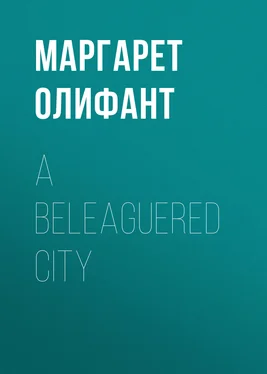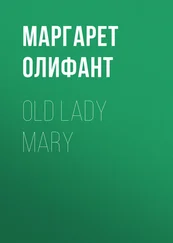Маргарет Олифант - A Beleaguered City
Здесь есть возможность читать онлайн «Маргарет Олифант - A Beleaguered City» — ознакомительный отрывок электронной книги совершенно бесплатно, а после прочтения отрывка купить полную версию. В некоторых случаях можно слушать аудио, скачать через торрент в формате fb2 и присутствует краткое содержание. Жанр: foreign_sf, literature_19, foreign_antique, foreign_prose, на английском языке. Описание произведения, (предисловие) а так же отзывы посетителей доступны на портале библиотеки ЛибКат.
- Название:A Beleaguered City
- Автор:
- Жанр:
- Год:неизвестен
- ISBN:нет данных
- Рейтинг книги:5 / 5. Голосов: 1
-
Избранное:Добавить в избранное
- Отзывы:
-
Ваша оценка:
- 100
- 1
- 2
- 3
- 4
- 5
A Beleaguered City: краткое содержание, описание и аннотация
Предлагаем к чтению аннотацию, описание, краткое содержание или предисловие (зависит от того, что написал сам автор книги «A Beleaguered City»). Если вы не нашли необходимую информацию о книге — напишите в комментариях, мы постараемся отыскать её.
A Beleaguered City — читать онлайн ознакомительный отрывок
Ниже представлен текст книги, разбитый по страницам. Система сохранения места последней прочитанной страницы, позволяет с удобством читать онлайн бесплатно книгу «A Beleaguered City», без необходимости каждый раз заново искать на чём Вы остановились. Поставьте закладку, и сможете в любой момент перейти на страницу, на которой закончили чтение.
Интервал:
Закладка:
I will not pretend that this was to me a night of rest. In the darkness, when all is still, any anxiety which may afflict the soul is apt to gain complete possession and mastery, as all who have had true experience of life will understand. The night was very dark and very still, the clocks striking out the hours which went so slowly, and not another sound audible. The streets of Semur are always quiet, but they were more still than usual that night. Now and then, in a pause of my thoughts, I could hear the soft breathing of my Agnès in the adjoining room, which gave me a little comfort. But this was only by intervals, when I was able to escape from the grasp of the recollections that held me fast. Again I seemed to see under my closed eyelids the faint line of the high road which led from the Porte St. Lambert, the broken ground with its ragged bushes on either side, and no one—no one there—not a soul, not a shadow: yet a multitude! When I allowed myself to think of this, my heart leaped into my throat again, my blood ran in my veins like a river in flood. I need not say that I resisted this transport of the nerves with all my might. As the night grew slowly into morning my power of resistance increased; I turned my back, so to speak, upon my recollections, and said to myself, with growing firmness, that all sensations of the body must have their origin in the body. Some derangement of the system easily explainable, no doubt, if one but held the clue—must have produced the impression which otherwise it would be impossible to explain. As I turned this over and over in my mind, carefully avoiding all temptations to excitement—which is the only wise course in the case of a strong impression on the nerves—I gradually became able to believe that this was the cause. It is one of the penalties, I said to myself, which one has to pay for an organisation more finely tempered than that of the crowd.
This long struggle with myself made the night less tedious, though, perhaps, more terrible; and when at length I was overpowered by sleep, the short interval of unconsciousness restored me like a cordial. I woke in the early morning, feeling almost able to smile at the terrors of the night. When one can assure oneself that the day has really begun, even while it is yet dark, there is a change of sensation, an increase of strength and courage. One by one the dark hours went on. I heard them pealing from the Cathedral clock—four, five, six, seven—all dark, dark. I had got up and dressed before the last, but found no one else awake when I went out—no one stirring in the house,—no one moving in the street. The Cathedral doors were shut fast, a thing I have never seen before since I remember. Get up early who will, Père Laserques the sacristan is always up still earlier. He is a good old man, and I have often heard him say God's house should be open first of all houses, in case there might be any miserable ones about who had found no shelter in the dwellings of men. But the darkness had cheated even Père Laserques. To see those great doors closed which stood always open gave me a shiver, I cannot well tell why. Had they been open, there was an inclination in my mind to have gone in, though I cannot tell why; for I am not in the habit of attending mass, save on Sunday to set an example. There were no shops open, not a sound about. I went out upon the ramparts to the Mont St. Lambert, where the band plays on Sundays. In all the trees there was not so much as the twitter of a bird. I could hear the river flowing swiftly below the wall, but I could not see it, except as something dark, a ravine of gloom below, and beyond the walls I did not venture to look. Why should I look? There was nothing, nothing, as I knew. But fancy is so uncontrollable, and one's nerves so little to be trusted, that it was a wise precaution to refrain. The gloom itself was oppressive enough; the air seemed to creep with apprehensions, and from time to time my heart fluttered with a sick movement, as if it would escape from my control. But everything was still, still as the dead who had been so often in recent days called out of their graves by one or another. ‘Enough to bring the dead out of their graves.’ What strange words to make use of! It was rather now as if the world had become a grave in which we, though living, were held fast.
Soon after this the dark world began to lighten faintly, and with the rising of a little white mist, like a veil rolling upwards, I at last saw the river and the fields beyond. To see anything at all lightened my heart a little, and I turned homeward when this faint daylight appeared. When I got back into the street, I found that the people at last were stirring. They had all a look of half panic, half shame upon their faces. Many were yawning and stretching themselves. ‘Good morning, M. le Maire,’ said one and another; ‘you are early astir.’ ‘Not so early either,’ I said; and then they added, almost every individual, with a look of shame, ‘We were so late this morning; we overslept ourselves—like yesterday. The weather is extraordinary.’ This was repeated to me by all kinds of people. They were half frightened, and they were ashamed. Père Laserques was sitting moaning on the Cathedral steps. Such a thing had never happened before. He had not rung the bell for early mass; he had not opened the Cathedral; he had not called M. le Curé. ‘I think I must be going out of my senses,’ he said; ‘but then, M. le Maire, the weather! Did anyone ever see such weather? I think there must be some evil brewing. It is not for nothing that the seasons change—that winter comes in the midst of summer.’
After this I went home. My mother came running to one door when I entered, and my wife to another. ‘ O mon fils! ' and ' O mon ami! ’ they said, rushing upon me. They wept, these dear women. I could not at first prevail upon them to tell me what was the matter. At last they confessed that they believed something to have happened to me, in punishment for the wrong done to the Sisters at the hospital. ‘Make haste, my son, to amend this error,’ my mother cried, ‘lest a worse thing befall us!’ And then I discovered that among the women, and among many of the poor people, it had come to be believed that the darkness was a curse upon us for what we had done in respect to the hospital. This roused me to indignation. ‘If they think I am to be driven from my duty by their magic,’ I cried; ‘it is no better than witchcraft!’ not that I believed for a moment that it was they who had done it. My wife wept, and my mother became angry with me; but when a thing is duty, it is neither wife nor mother who will move me out of my way.
It was a miserable day. There was not light enough to see anything—scarcely to see each other's faces; and to add to our alarm, some travellers arriving by the diligence (we are still three leagues from a railway, while that miserable little place, La Rochette, being the chef-lieu, has a terminus) informed me that the darkness only existed in Semur and the neighbourhood, and that within a distance of three miles the sun was shining. The sun was shining! was it possible? it seemed so long since we had seen the sunshine; but this made our calamity more mysterious and more terrible. The people began to gather into little knots in the streets to talk of the strange thing that was happening In the course of the day M. Barbou came to ask whether I did not think it would be well to appease the popular feeling by conceding what they wished to the Sisters of the hospital. I would not hear of it. ‘Shall we own that we are in the wrong? I do not think we are in the wrong,’ I said, and I would not yield. ‘Do you think the good Sisters have it in their power to darken the sky with their incantations?’ M. l'Adjoint shook his head. He went away with a troubled countenance; but then he was not like myself, a man of natural firmness. All the efforts that were employed to influence him were also employed with me; but to yield to the women was not in my thoughts.
Читать дальшеИнтервал:
Закладка:
Похожие книги на «A Beleaguered City»
Представляем Вашему вниманию похожие книги на «A Beleaguered City» списком для выбора. Мы отобрали схожую по названию и смыслу литературу в надежде предоставить читателям больше вариантов отыскать новые, интересные, ещё непрочитанные произведения.
Обсуждение, отзывы о книге «A Beleaguered City» и просто собственные мнения читателей. Оставьте ваши комментарии, напишите, что Вы думаете о произведении, его смысле или главных героях. Укажите что конкретно понравилось, а что нет, и почему Вы так считаете.












